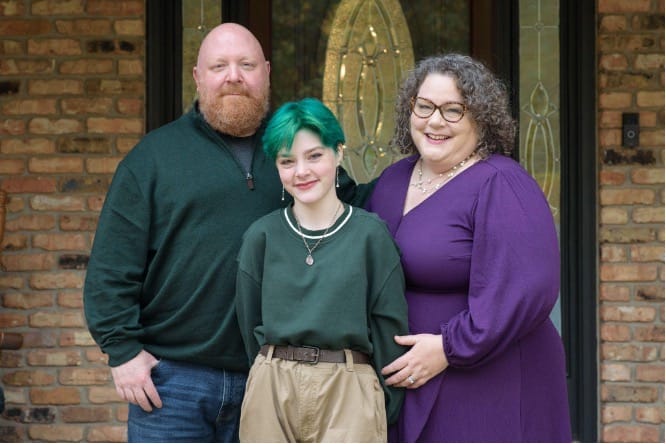By Jae Moore
A new story in the fight against discriminatory book bans is coming into focus in Iowa, where GOP presidential candidates are facing off next month for the Iowa caucuses. After candidates backed by book-banning group Moms for Liberty were resoundingly rejected by voters last month, authors and advocates are accelerating the story of equality via lawsuits directly challenging Iowa’s chaotic, costly, and unconstitutional, Senate File 496 (SF 496).
Governor Kim Reynolds threw her support behind Florida Governor Ron DeSantis going into the caucuses for president. Both governors are publicly affiliated with Moms for Liberty, and signed a record number of anti-LGBTQ bills in their states. Reynolds’ bills and rhetoric include: transgender youth, HIV and AIDS education, LGBTQ topics in the classroom, and access to diverse reading materials. To date, more than 1,000 books and 500 unique titles have been pulled from Iowa schools (for context, PEN America recently revealed that more than 1,500 titles were banned nationwide during the 2022-23 school year). Iowa’s book banning is incorporated within SF 496, a vague law (Iowa Board of Education’s proposed rules did little to clarify) which is now the subject of two lawsuits.
Late last month, Lambda Legal (an organization dedicated to pursuing and protecting LGBTQ civil rights), the ACLU of Iowa, and law firm Jenner & Block LLP filed a federal lawsuit hoping to stop Iowa’s law. Filed on behalf of eight Iowa students and nonprofit Iowa Safe Schools (supports “safe, supportive, and nurturing learning environments” for LGBTQ youth), the lawsuit targets key components of SF 496. It argues that the law is unconstitutional, violating the First Amendment’s protections for free speech and the 14th Amendment, providing equal protection.
Lambda Legal Senior Attorney Nathan Maxwell explained that the law puts the mental and physical well-being of students at risk and sends a dangerous message: “LGBTQ+ kids are too shameful to be acknowledged.” One affected student, high school senior and plaintiff Puck Carlson, spoke out. “I am not shameful,” said Carlson. “I have an LGBTQ little sister who I love more than anything in the world, and she is not shameful. She deserves to be herself and know that she belongs.”
A second lawsuit was introduced a few days after the first. This time, Penguin Random House (PRH) and the Iowa State Education Association entered the mix. Representing not only the affected students but also educators and authors, the PRH suit focuses on the portion of SF 496 that bans “books that feature any description or depiction of sex — regardless of context or whether the work is fiction or nonfiction — from schools and classroom libraries from kindergarten through grade 12.”
Students and families represented in the lawsuits against Iowa Senate File 496.



In a statement, PRH CEO Nihar Malaviya stressed the importance of free speech and a variety of perspectives. “We know that not every book we publish will be for every reader,” Malaviya said, “but we must protect the right for all Americans, including students, parents, caregivers, teachers and librarians, to have equitable access to books and to continue to decide what they read.”
@penguinrandomhouse Penguin Random House, the Iowa State Education Association, four renowned authors whose books have been banned or removed in Iowa, three educators, a high school student, and parent have filed a lawsuit against the state of Iowa to block Senate File 496! #BannedBooks #ReadBannedBooks #greenscreen ♬ original sound – Penguin Random House
Plaintiffs in the case include bestselling authors John Green and Jodi Picoult, both of whom have been vocal opponents and frequent targets of book bans. PEN America noted that once an author has been targeted, they will likely be subject to repeated challenges, something they called the “Scarlet Letter” effect.

Speaking with the New York Times in September, Green shared that his books have been challenged for more than 15 years and have appeared a number of times on the American Library Association’s yearly list of most banned books. “I believe very strongly in the freedom of expression and in teenagers’ rights to read, and I feel very strongly that other parents shouldn’t have any say in what my kids get to read,” he said. “As long as that fight goes on, I feel obligated to lend my voice to it.”
I’m proud to be a part of this lawsuit.
Parents choose the books that their kids can read. They don’t have the right to dictate which books other people’s children can or can’t read. Neither do politicians.@PENamerica @MacKidsBooks @SSEdLib @HouseDemocrats @veronikellymars https://t.co/V7rBtSoAVS
— Laurie Halse Anderson (@halseanderson) November 30, 2023
According to Book Riot’s Kelly Jensen, taking legal action is “the way forward” in the face of repressive laws that restrict intellectual freedom. It’s happening all around the country: States with conservative leadership are implementing their own copycat “Don’t Say LGBTQ” laws (PEN America revealed that copycat bans are now “a key component” of the attacks waged against books), and organizations representing affected publishers, authors, educators, librarians, parents, and students are suing not only to block them, but also discourage future bans.
“There comes the point where the funders evaluate their target and begin to question if it’s worth the cost,” said Jensen. “In these situations, it’s going to be very expensive and probably not worth their time—especially because they know they’re not going to win on the grounds of the already-enshrined laws governing this country.”













